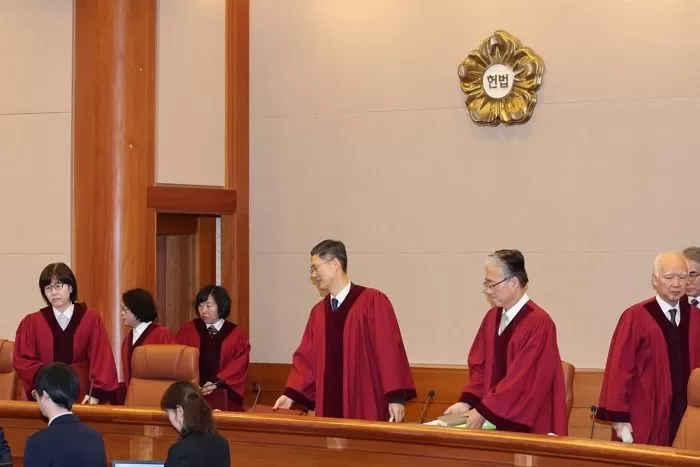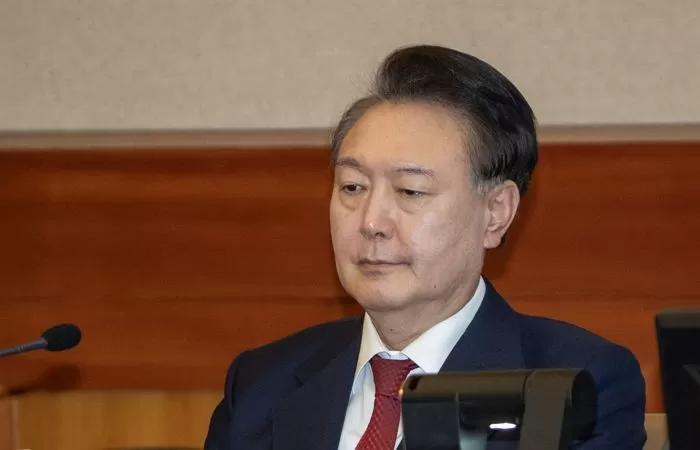The method of the Constitutional Court's impeachment ruling varies depending on the agreement of opinions
As the Constitutional Court announces its final decision regarding President Yoon Suk-yeol's impeachment on the 4th, interest in the ruling method is increasing.
It has been reported that the Constitutional Court has effectively finalized its conclusion through a verdict already on the 1st, and the justices are currently coordinating the ruling procedure and wording of the decision document while fine-tuning the final decision document.

According to internal guidelines of the Constitutional Court, the ruling method varies based on whether the justices reach a consensus. If the justices have a unanimous opinion, they explain the reasons for the decision first and then read the order.
On the other hand, if there are differing opinions, the ruling procedure notifies that there is a majority opinion and alternative views, and then reads the order stating "The respondent President Yoon Suk-yeol is impeached" or "This impeachment request is dismissed (or declared null)." After that, reasons for the decision are provided later.
Ruling Day Procedure and Estimated Duration
The ruling will commence when Acting Chief Justice Moon Hyung-bae states, "I will begin the ruling," reading the case number (2024HunNa8) and case name.
The effect of the ruling occurs at the moment the presiding judge reads the order, and the time and date of the ruling will be specified in detail down to the hour and minute in the decision document.
The time for reading the order and other periods are predetermined during deliberations, and it is reported that the reading justices will rehearse.
In past cases, the time taken to read the order was 28 minutes during the impeachment ruling of former President Roh Moo-hyun and 21 minutes for former President Park Geun-hye.
In the case of President Yoon, it is expected that the ruling will take about an hour due to the inclusion of five grounds for impeachment as well as procedural issues raised during the trial.
President Yoon has announced that he will not attend the Constitutional Court on the day of the ruling.
Finalization Process of the Ruling Document
Typically, a final draft of the decision document is prepared by the researchers of the Constitutional Court, summarizing the key points, which the presiding judge (including all justices if opinions differ) ultimately fine-tunes and practices reading.
On the day before the ruling, the 3rd, the Constitutional Court held deliberations among the justices in the morning and afternoon to finalize details regarding the ruling procedure and wording of the decision document.
During the impeachment ruling of former President Park Geun-hye, Justice Lee Jeong-mi was captured by cameras practicing reading the ruling document in a vehicle while forgetting to remove her hair rollers, which became a topic of discussion.
It is known that justices are conducting thorough preparations for the important ruling.

Press Environment and Live Broadcast Plans on Ruling Day
On the day of the ruling, the Constitutional Court plans to enhance security around the building and strictly control the entrance of spectators.
Initially, the Constitutional Court announced a complete ban on media coverage of the justices entering on the ruling day, but after careful consideration, it decided to partially accommodate media requests, allowing for limited filming and coverage.
This ruling will reportedly be broadcast live through major broadcasting stations, and it is expected that the decision document will be made public without a separate press conference after the reading of the ruling.
A Constitutional Court official stated, "We are making full preparations to ensure that the ruling procedure proceeds smoothly" and added, "We hope that the public will calmly watch the Constitutional Court's decision."
This decision by the Constitutional Court is expected to be an important milestone in the constitutional history of the Republic of Korea.
Image Source: News1, President Yoon Suk-yeol / News1
![[Full Text] “The Respondent President Yoon Suk-yeol is removed from office” … Full Text of the Constitutional Court’s Impeachment Ruling](https://wordkorean.com/wp-content/uploads/2025/04/thumbnail-149.webp)
![[Breaking News] Yoon Gap-geun “Yoon’s Dismissal is a Political Decision… I Can’t Accept It Legally”](https://wordkorean.com/wp-content/uploads/2025/04/thumbnail-148.webp)
![[Breaking News] People Power Party: “‘Decision to Impeach the President’ is Regrettable but We Will Humble Accept It”](https://wordkorean.com/wp-content/uploads/2025/04/thumbnail-147.webp)